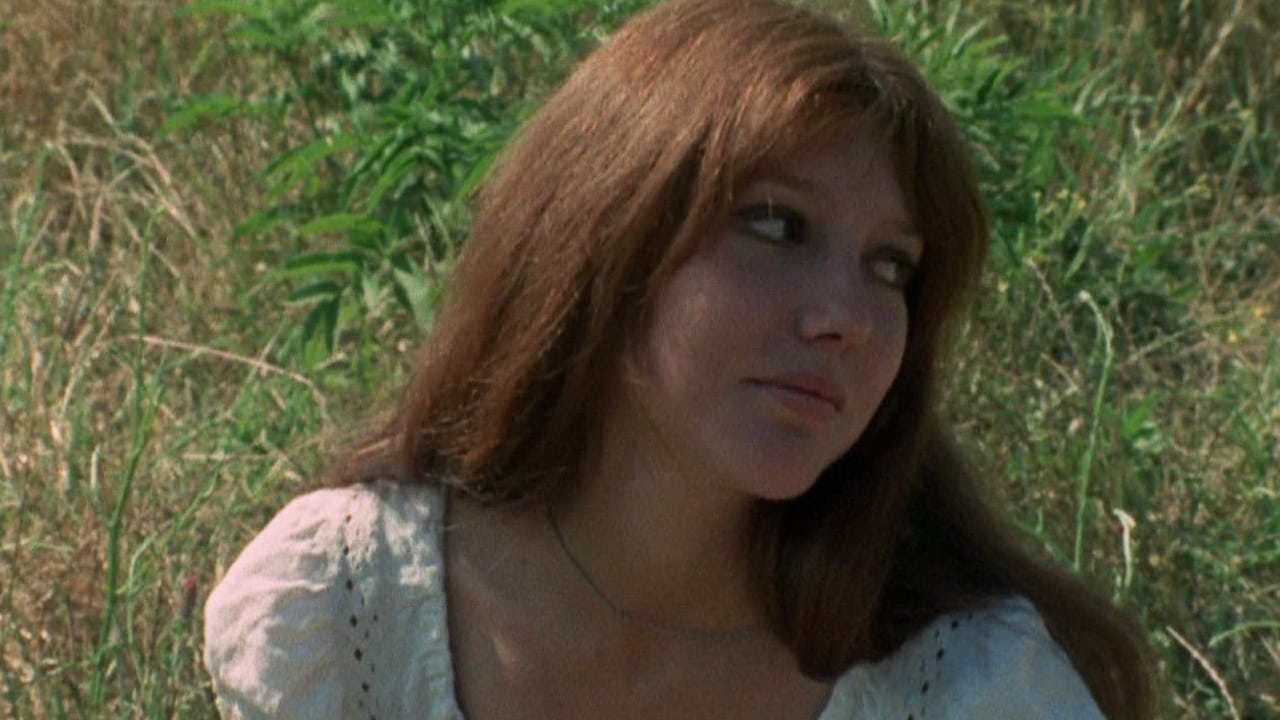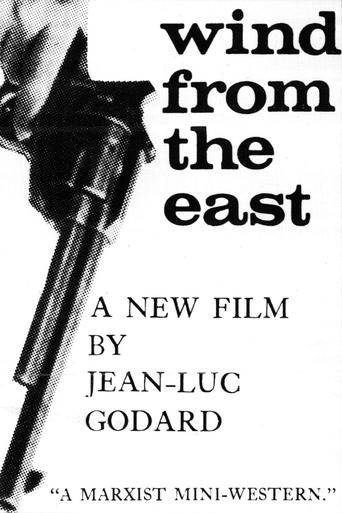Teringer
An Exercise In Nonsense
Voxitype
Good films always raise compelling questions, whether the format is fiction or documentary fact.
Ortiz
Excellent and certainly provocative... If nothing else, the film is a real conversation starter.
Gloede_The_Saint
Whatever you feel about the French New Wave and Godards work in this period we have to realize one thing - it had imprisoned him. The wave he himself had co-created would tie him to norms. Now it was gone. He was no longer in the searchlight, his films got smaller and smaller.JLG was always experimental, always unique and often too much in his own world to be relatable for the public. However, he had for a certain time been an icon. Now, he was free. He could make whatever he wanted, regardless of form and norms. The end of the New Waves marks the beginning of his experimental awakening and the growth of his love for cinema.In all regards Wind From the East can be considered an "anti"-film. A film so far from the norm of what beauty and storytelling is that it becomes an example of just that. A exercise of creativity, of styles and of ideas.Emotionally, I get throwback to Jancso's Red Psalm(which ironically was made a two years later), because this is indeed a work of communist art - A political belief system that does not coincide with my own, from a time that disappeared long before I was born.It speaks of revolution and violence as so many other Godards have done, but here it becomes part of both the abstract and the unconscious. But then, this is what beauty is. It's poetry - pure but perhaps not too simple. It reflects times that are gone, ideas left behind and a world unknown.
where's da feesh
When one enters a movie theater with the intention to watch a Godard film, one has to bear in mind that: 1)it will not be a 'regular', that is 'industrial' film, with linear narrative; and 2)there will be a strong reaction from the viewer (usually negative, especially from people who are not used to watching this authorial/Nouvelle Vague/Cinema Novo type of film, and even more especially on those that says 'mise-en-scène: Jean-Luc Godard' somewhere during the credits."Wind From the East" ("Le Vent D'Est", "Vento do Leste") is a very deep and highly political discussion about communism, capitalism, art, revolution, intellectualism, Maoism, USSR, tradition, paradigms, poetry... It's hard to put it in terms of "it's about...", since the sequence of images is not based in any form of traditional narrative. In fact, it's the very opposite of it, its essence sprouting from the need of subversion, a need directly connected to the social/historical/political/artistic context of the 60's and 70's: to show things in a different way leads the viewer to see differently, therefore to think differently. A experimental cut, poetic even, given the metaphorical quality of the images. The frontiers of film language fades and encounters those of other art forms, not to weaken the film unity nor its message, but to strengthen them both.One highlight (attention, should NOT be taken as a spoiler): the featuring of Glauber Rocha, director representative of Brazilian Cinema Novo (whose political attitude towards cinema establishes the proper dialog with Group Dziga Vertov's intention), singing Gal Costa's "Divino, Maravilhoso" (something like "Divine, Wonderful").Long story short: a wonderful film, Godard in tip-top shape! For stuff alike watch "Sympathy for the Devil:One Plus One" [1968], featuring the creative process in which the Stones made song number one from "Beggars Banquet".
adrian_knott
Film theorists like to call this type of film an example of "counter-cinema", an attempt by a filmmaker to dislocate the viewer from any pre-conceived ideas of, say, narrative and acting so that he can raise the question of what traditional narrative cinema does to the spectator. In other words, by drawing our attention to the way a film is made he can confound our enjoyment and break the hypnotic effect a traditional film has on us. But who the hell wants that? If I wanted my enjoyment confounded, I'd rent "Flowers in the Attic"."Le Vent d'est" isn't so much a film as an essay on Communism and the insidious effect American culture has on the individual. It's also possibly the funniest thing I've ever seen. I saw this in an arthouse cinema in the late eighties and for two hours I sat biting my lower lip to prevent myself from laughing out loud. I needn't have bothered, because most of the audience had left within half an hour of the film starting. I wish I could remember it more vividly because I could share with you some of the stuff in it. One scene I do remember, though, is the one where Gian Maria Volonte (the bad guy in the Clint Eastwood spaghetti westerns) throttles some woman while someone else off-screen pelts her on the back of the head with red paint. What does it mean? Who knows? In this case, I'm proud to be a philistine.The worst thing about this film isn't the acting, the direction, or the dialogue (these are all irrelevant in this film, anyway). No, the worst thing is that Godard is arrogant enough to suggest that the average audience has no critical faculties of its own. Even worse that he feels he has to draw it to our attention.
David Edward Martin
You know those "worst films of all time" lists? This one tops my list!How to describe it? The film is a long pointless diatribe against the West and an endorsement of French Communism. The film supposedly illustrates crimes against society committed by the west but the acting (and costuming) looked like a Haight Ashbury Summer'o'Love stock production.The film is very grainy. Apparently Godard shot it on 8mm film. His disciples then blew it up to 35mm for its extremely limited arthouse release. The copy I suffered through had been shrunk back to 16mm (the format for rental films).Oh, and the narration? Godard's diatribe is delivered by a somewhat bored Frenchman. That was bad enough but Godard's disciples had added an English-speaking female narrator to make the politics accessible to western audiences. The problem was, Godard refused to let them delete the French voicetrack! So.... for two wretched hours, the French and English narrations go on SIMULTANEOUSLY! Add to this the lousy acting, minimal production, and grainy film and you have EXCEDERIN HEADACHE #1.

